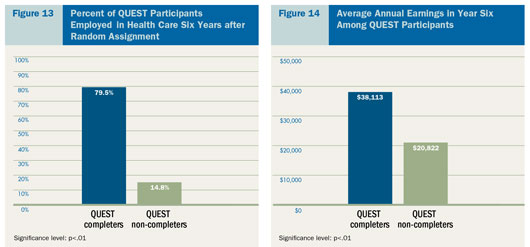Project QUEST: Workforce Development That Works

A multiyear evaluation of Project QUEST, a workforce training program in San Antonio, shows that sector strategies — an approach to increasing jobs and career opportunities that the Casey Foundation has invested in for the last two decades — help low-income job seekers develop meaningful careers that lift them out of poverty.
Graduates of the program saw large increases in their pay over time. Average annual earnings grew from $11,400 for those entering the program to more than $38,000 by the final year of the randomized controlled trial. A report on the evaluation, Escalating Gains: Project QUEST’s Sectoral Strategy Pays Off, notes that participants who did not complete the program still earned higher hourly wages than individuals in the comparison group.
As low-skill manufacturing jobs began disappearing in the 1980s, two community-based organizations — COPS (Communities Organized for Public Service) and Metro Alliance — founded QUEST to help San Antonio residents gain skills to meet employers’ needs in growing sectors of the local economy. With support including assistance with tuition, transportation and child care expenses, mental health services and job placement assistance, the program helps participants complete occupational training at community colleges, obtain certifications and get and keep family-supporting jobs. To date, QUEST has served more than 6,000 people, with 87% completing the program.

Unlike other studies that typically track outcomes for two years, the rigorous QUEST evaluation followed program participants for six. It began in 2005 and focused on individuals pursuing careers in the health-care sector. About 74% of participants were Latino women with children, and nearly half had attended college in the past but had not earned a degree. QUEST, which the Foundation supported directly for several years, not only increased participants’ earnings, the study finds, it helped graduates reach the middle class. According to the authors, few workforce development programs have created this kind of mobility.
“We are excited about these findings for several reasons,” said Irene Lee, who leads the Foundation’s family economic success work. “Not only do they show significant gains in earnings that did not fade over time, but they demonstrate that sector strategies can help ensure a more equitable distribution of jobs and wealth among communities of color.”
Among the evaluation’s other key findings:
- Job seekers ages 25–64 and those who entered the program with a GED saw the greatest increases in their earnings.
- By the end of the evaluation period, graduates’ earnings were equivalent to average middle-class incomes in larger, more costly cities — $51,000 in Chicago, $61,000 in Los Angeles and $64,000 in Washington, D.C.
- QUEST participants who did not graduate were still more consistently employed than the control group, and they earned, on average, nearly $2 more per hour.
- Program participants in the six-year follow-up survey reported greater financial stability than the control group and less difficulty paying for housing, utilities or food.
Because training takes place through local community colleges, QUEST’s approach can easily be adapted to meet the needs of employers in other sectors throughout the country, the report finds.
“This evaluation is further proof that sector strategies truly are effective,” said Allison Gerber, a senior associate who leads the Foundation’s investments in education, employment and training. “We hope these results encourage both policymakers and workforce practitioners to explore implementing these approaches at a much larger scale in their communities, so that more low-income job seekers can realize the incredible gains San Antonio residents have.”
In addition to funding this evaluation, Casey is supporting a qualitative study of QUEST participants’ experiences that will be released in 2018.





